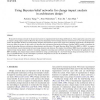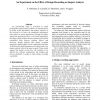127
click to vote
JSS
2007
15 years 1 months ago
2007
Research into design rationale in the past has focused on argumentation-based design deliberations. These approaches cannot be used to support change impact analysis effectively ...
105
click to vote
RE
2002
Springer
15 years 1 months ago
2002
Springer
Posing speculative questions about a software system is an important yet often unsupported activity. Current impact analysis techniques tend to focus upon the functionality of the...
105
click to vote
ICSM
1994
IEEE
15 years 6 months ago
1994
IEEE
An experimental study is presented in which participants perform impact analysis on alternate forms of design record information. The primary objective of the research is to asses...
133
click to vote
ECOOPW
1999
Springer
15 years 6 months ago
1999
Springer
Impact analysis is seen as an important technique for controlling the evolution of software systems. Numerous approaches have been proposed which aim to assess the impact of chang...
114
click to vote
ICSM
1999
IEEE
15 years 6 months ago
1999
IEEE
Many coupling measures have been proposed in the context of object-oriented (OO) systems. In addition, several studies have highlighted the complexity of using dependency analysis...
114
click to vote
IWPC
2002
IEEE
15 years 7 months ago
2002
IEEE
Impact analysis is needed for the planning and estimation of software maintenance projects. Traditional impact analysis techniques tend to be too expensive for this phase, so ther...
102
click to vote
ISSRE
2003
IEEE
15 years 7 months ago
2003
IEEE
Impact analysis – determining the potential effects of changes on a software system – plays an important role in helping engineers re-validate modified software. In previous ...
119
click to vote
CSMR
2005
IEEE
15 years 7 months ago
2005
IEEE
Impact analysis is the process of determining the effect, or impact, of a change to a software system. Dynamic impact analysis uses data obtained from executing a program to perfo...
126
click to vote
KBSE
2006
IEEE
15 years 8 months ago
2006
IEEE
Software systems often undergo many revisions during their lifetime as new features are added, bugs repaired, abstractions simplified and refactored, and performance improved. Wh...
135
click to vote
ICSEA
2006
IEEE
15 years 8 months ago
2006
IEEE
The benefits of impact analysis in the maintenance and evolution of software systems are well known, and many forms of impact analysis, over different software life cycle objects...




